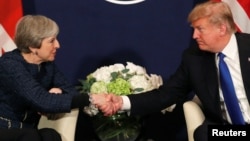Donald Trump is set to arrive in Britain on July 12, his first official trip as U.S. president to one of America’s oldest allies. The trip is a working visit rather than a state visit, meaning he will not be invited to meet Queen Elizabeth.
The visit has been repeatedly delayed following political and public opposition, and thousands are preparing to take to the streets to demonstrate against the visit.
“I’ll be out there protesting. I’m not really a demonstration sort of person, but I feel quite strongly that he shouldn’t be welcomed,” London resident Terry told VOA. She did not want to give her full name.
“I don’t particularly agree with a lot of the things he’s done, but at the same time I think he’s done well for America. So, I think he should come as an ally,” said fellow London resident Cameron Smith.
WATCH: 'Special Relationship' Tested as Britain Prepares to Host President Trump
Supporters of Trump’s visit say they fear the protests could overshadow its political importance. David Sergeant is from the conservative policy institute The Bow Group.
“We don’t want a tiny, but vocal and quite aggressive minority, to be portrayed as the wider British population,” he told VOA.
Off to a good start
Donald Trump and Prime Minister Theresa May got off to a good start in Washington in January 2017, shortly after the president’s inauguration, memorably holding hands as they walked into the gardens of the White House. The so-called “special relationship,” however, is now being tested, says Leslie Vinjamuri, head of the U.S. and Americas program at policy group Chatham House.
“The retweeting of a far-right video (by Trump) produced a storm of conversation in parliament, protests on the streets. And he’s coming here right on the back of the tariffs that have been lodged against Europe, on the back of pulling out of the Iran deal, and most perhaps recently the very bad press coverage of his policy of separating (undocumented migrant) families, parents from their children.”
Trump’s visit comes at a critical time for Britain as it struggles to secure a preferential deal with Brussels on leaving the European Union. Fears are growing that Britain may crash out of the bloc with no deal as a March 2019 deadline approaches.
“In an era of Brexit, we need to be building alliances around the globe. And there is no stronger alliance that we’ve ever had than with the United States of America,” says David Sergeant of the Bow Group.
Trump doesn’t attach the same priority to Britain, says Leslie Vinjamuri of Chatham House.
“I suspect there will be an affirmation of America’s relationship with the UK, of a commitment to some sort of trade deal. But I suspect we’ll see very little after he leaves. They’ll return to some of the topics that we would expect: the security cooperation, NATO,” she said.
A potentially contested NATO summit in Brussels immediately precedes Trump’s London visit. Straight after his trip to Britain, the president is scheduled to fly to Helsinki to meet Russian counterpart Vladimir Putin, on July 16.
“Two other visits that are much more important frankly, to the American president,” Vinjamuri said.
As thousands of protesters prepare to take to the streets, the optics could play a big part in how it is perceived on both sides of the Atlantic.






